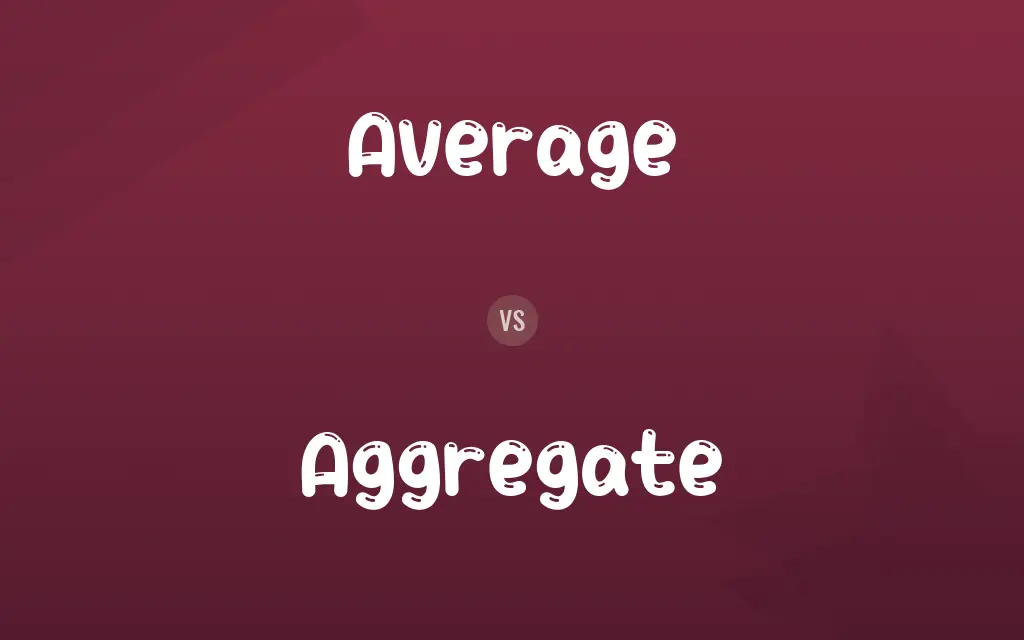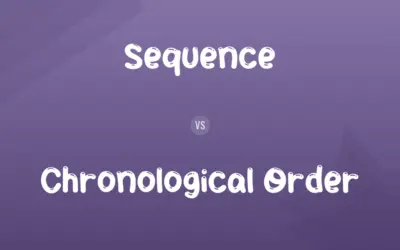Average vs. Aggregate: Difference and Comparison
By Muazma Batool & Muneeza Rehman — Published on April 9, 2024
Average is a single value representing the central or typical value in a set of data, while aggregate is the total sum or combination of all items in a dataset.

Difference Between Average and Aggregate
The average is calculated by summing all values in a dataset and dividing by the number of values, offering a central point that typifies the data. In contrast, the aggregate represents the overall sum or total of all values, providing a cumulative measure without considering distribution or centrality.
Muazma Batool
Apr 09, 2024
Averages are used to understand the typical or central tendency of data, helpful in scenarios where comparing groups or understanding general trends is necessary. Aggregates, however, are more about the total impact or sum of a dataset, useful in accounting, finance, and when assessing total resources or outputs.
Muazma Batool
Apr 09, 2024
Averages can smooth over the extremes in data to present a more understandable central value, aggregates encompass the entirety of the data, including all variances and extremes, without filtering or centralizing.
Muazma Batool
Apr 09, 2024
Calculating an average can sometimes mask the diversity or disparity within a dataset, as it focuses on a midpoint. Aggregates reveal the total size or volume of data but not its spread or typical conditions, which can be misleading in understanding individual parts' contributions.
Elijah
Apr 09, 2024
Both average and aggregate serve different analytical purposes: averages for identifying trends and norms within data, and aggregates for assessing overall magnitude or total value. Their application depends on the context and the specific insights sought from the data.
Jonathan
Apr 09, 2024
Average vs. Aggregate Comparison Chart
Definition
The central value in a dataset
The total sum of all items in a dataset
Muazma Batool
Apr 09, 2024
Average vs. Aggregate Definitions
◉Average
Represents the midpoint in a dataset.
The average age at the company is 30 years.
Muazma Batool
Feb 22, 2024
◉Aggregate
Represents the cumulative measure.
Aggregate sales this quarter exceeded expectations.
Muazma Batool
Feb 22, 2024
◉Average
Calculated as the sum of values divided by their number.
The average score was determined by totaling all scores and dividing by the number of participants.
Muazma Batool
Feb 22, 2024
◉Aggregate
Used to assess overall resources or outputs.
The project's aggregate cost includes materials, labor, and overhead.
Muazma Batool
Feb 22, 2024
◉Average
Helps in understanding general trends.
The average temperature in July helps plan activities.
Muazma Batool
Feb 22, 2024
◉Aggregate
Does not consider distribution or centrality.
The aggregate score of the team shows total points, not individual contributions.
Muazma Batool
Feb 22, 2024
◉Average
A mathematical metric for central tendency.
The average income in the city shows economic status.
Muazma Batool
Feb 22, 2024
◉Aggregate
Useful in finance and accounting.
The aggregate expenditure of the department falls within the budget.
Nolan
Feb 22, 2024
◉Average
Can smooth over extremes in data.
The average grade in class doesn't show the few failing scores.
Leo
Feb 22, 2024
◉Aggregate
The total sum of all values in a dataset.
The aggregate income of all employees reflects the company's payroll expense.
Muazma Batool
Feb 22, 2024
◉Aggregate
Constituting or amounting to a whole; total
Aggregate sales in that market.
Muazma Batool
Feb 21, 2024
Average vs. Aggregate Frequently Asked Questions
How is aggregate different from total?
Aggregate is synonymous with total; both refer to the overall sum of items in a dataset.
Muazma Batool
Apr 09, 2024
When would you use an average instead of an aggregate?
Use an average to find a representative value for comparison or trend analysis, and an aggregate for assessing the total sum or impact.
Muazma Batool
Apr 09, 2024
Can aggregate data be misleading?
Yes, because it doesn't show the distribution or individual values, aggregate data can obscure disparities within the dataset.
Muazma Batool
Apr 09, 2024
Can the average and aggregate be the same?
In datasets with only one value, the average and aggregate are the same, but typically, they represent different metrics.
Nolan
Apr 09, 2024
How does average help in daily life?
Averages help in making general assessments, such as understanding economic trends, academic performance, or health indicators.
Henry
Apr 09, 2024
Why is knowing the average important?
Knowing the average is important for understanding the central tendency, which helps in making informed decisions or comparisons.
Muazma Batool
Apr 09, 2024
What role does aggregate play in economics?
In economics, aggregate figures like GDP or total output play crucial roles in assessing the health and productivity of an economy.
Nolan
Apr 09, 2024
How do you calculate the aggregate?
Calculate the aggregate by summing all the individual values in a dataset.
Henry
Apr 09, 2024
What does average signify in data analysis?
Average signifies the central or typical value, helping understand the general trend or norm within a dataset.
Muazma Batool
Apr 09, 2024
Is the average always a good representation of data?
Not always, as averages can be affected by outliers and may not accurately represent data with high variance.
Jonathan
Apr 09, 2024
Content Creators
Written by
Muazma BatoolAs a content editor, Muazma Batool is not just a grammar guru but a creative mastermind who breathes life into every word. With an eagle eye for detail and a passion for storytelling, she transforms bland text into engaging content that captivates audiences and drives results.
Co-written by
Muneeza RehmanAt Comparisons.wiki, Muneeza skillfully navigates the vast sea of information, ensuring clarity and accuracy as the lead content editor. With a keen eye for detail, she curates every comparison to enlighten and engage readers.





























